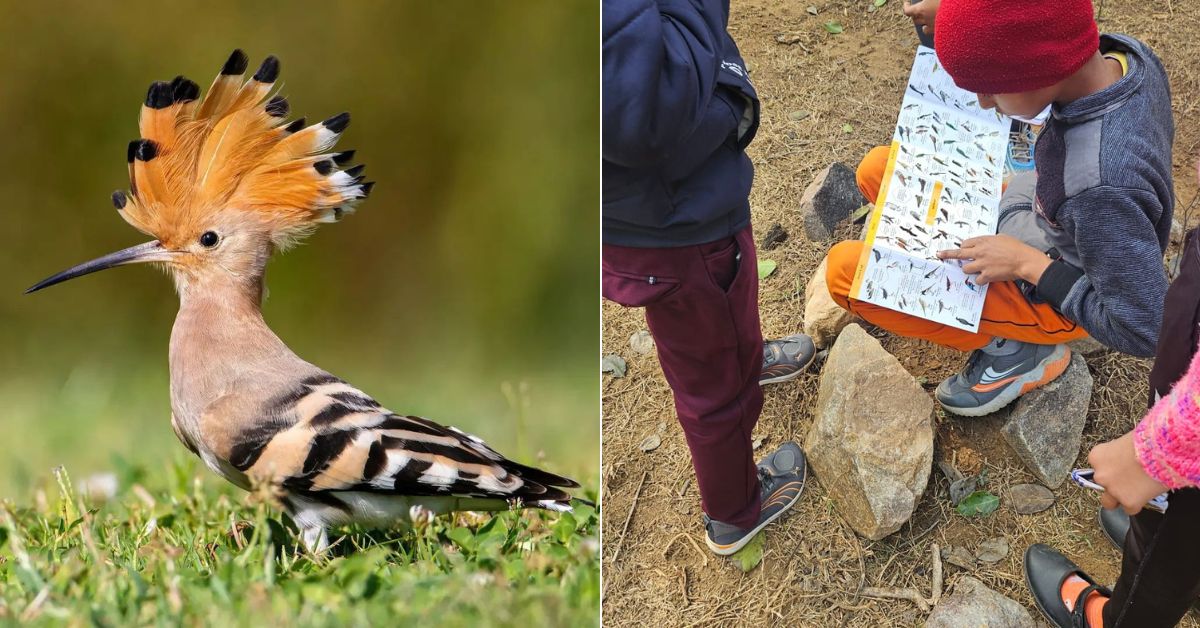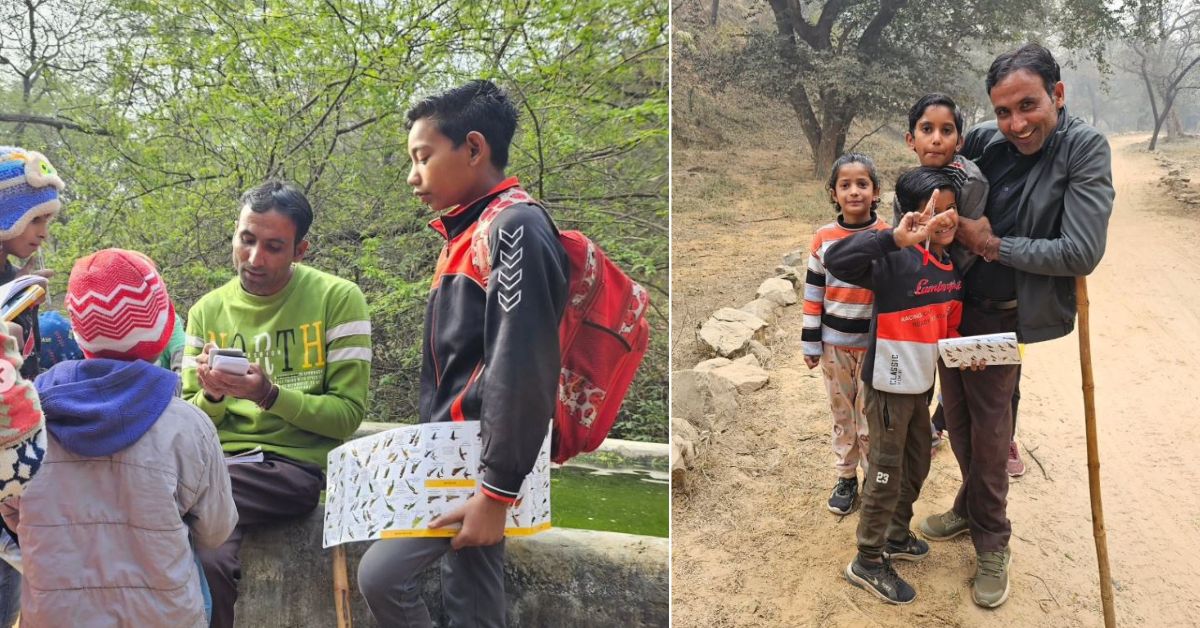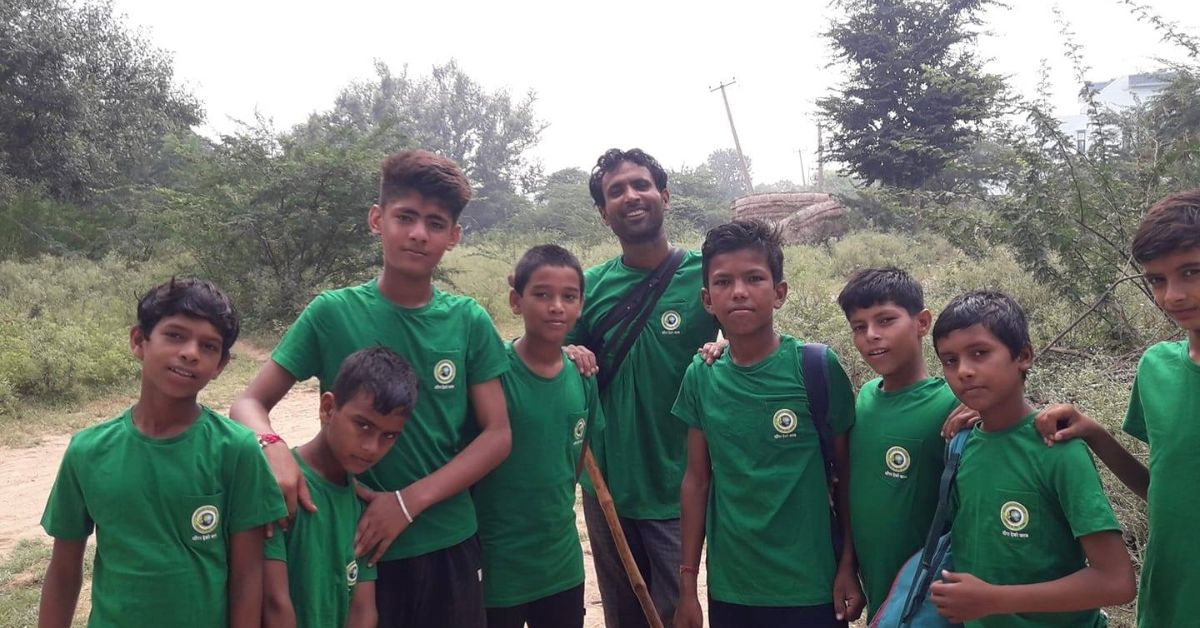Meet The ‘Pied Piper’ Fighting To Save One of Delhi’s Last Remaining Green Lungs
Nestled within the rugged landscapes of the Aravali hills, school-going children gather in the Mangar Bani forest every weekend to engage in a myriad of activities, each designed to instill a deep appreciation for the environment.
One such activity is ‘Pakshi Jeevan Ek Sangharsh’ (The Struggles of a Bird’s Life). Here, the children take on the roles of birds. Through playful mimicry, they confront the harsh realities faced by their feathered friends, including the threats of storms, predators, habitat loss, and climate change. The activities create an understanding of how human actions — like using pesticides or cutting down trees — ripple through entire ecosystems.
It’s a lesson in empathy and conservation, aiming to reshape how children think about their relationship with nature.
 Sunil organises activities to show children that without conscious effort, the birds they’ve grown to love might never return.
Sunil organises activities to show children that without conscious effort, the birds they’ve grown to love might never return.
The activity ends joyously when they realise the impact of conservation efforts, as the “birds” dance, symbolising a successful return to their home. “This not only educates but emotionally connects the children to the real struggles of birds,” says Sunil Harsana, the brains behind these activities.
As Sunil guides them, the children realise that without conscious effort, the birds they’ve grown to love might never return. He believes that understanding and appreciating the natural world from a young age is imperative for sustainable conservation practices.
Where conservation feels like play
In 2015, Sunil founded the ‘Mangar Eco Club’, aiming to connect the younger generation with nature through experiential learning. Through hands-on activities like birdwatching, nature painting, and building check dams, kids learn to see the world through the eyes of an environmentalist.
“They become familiar with local biodiversity, understanding that without intervention, the 245 bird species, including endangered ones like the red-headed and Egyptian vultures in their forests may vanish,” he mentions.
Often referred to as the ‘Pied Piper of Mangar Bani’, Sunil leads a new generation – not with a magical flute, but with passion and commitment to nature, just as the Pied Piper of Hamelin taught moral lessons through his tales.
 In 2015, Sunil founded the ‘Mangar Eco Club’, aiming to connect the younger generation with nature through experiential learning.
In 2015, Sunil founded the ‘Mangar Eco Club’, aiming to connect the younger generation with nature through experiential learning.
So far, Sunil has inspired over 100 young minds, many of whom have continued to support conservation efforts. Some help in research, while some manage social media campaigns, proving the reach and impact of this grassroots movement.
One such student is Nikhil Gurjar, who met Sunil when he was in Class 7. Reflecting on his experiences, he shares: “I used to participate in these activities and learn about our environment. My friends and I eagerly looked forward to visiting the forest to learn about wildlife and birds. Initially, when I saw any four or five birds together, they were just chidiya (sparrows) to me, but now I can identify the various species and their names.”
After completing his schooling, Nikhil went on to pursue higher studies but eventually returned to work with Sunil. Now 23, he assists Sunil in organising campaigns and activities, participates in bird watching, and helps build check dams.
“Although I am currently based in Faridabad, I make it a point to help bhaiya (elder brother) whenever possible. We often cut down trees for development, but he advocates against this to protect Mangar, focusing on the environmental impact and what we leave for future generations,” Nikhil says.
Championing a green cause
Born into the pastoral community of Mangar village in the Faridabad district, Sunil’s upbringing was entwined with the rhythms of nature. Deeply dependent on livestock and forest resources, his community understood the delicate balance required to sustain their livelihoods.
However, when development projects earmarked this sacred land for industrial expansion in 2011, Sunil knew he had to act. “The designation of Mangar Bani as a development zone threatened not only the forest ecosystem but also the cultural and historical heritage of the region,” he says.
 Sunil, affectionately called the ‘Pied Piper of Mangar Bani’, leads a new generation – not with a magical flute, but with passion and commitment to nature.
Sunil, affectionately called the ‘Pied Piper of Mangar Bani’, leads a new generation – not with a magical flute, but with passion and commitment to nature.
The 35-year-old has dedicated his life to bridging the gap between youth and the environment. With a background in mass communication, and currently pursuing an MA in anthropology, Sunil’s work transcends educational activities.
He actively engages with local authorities and leverages media attention to resist illegal encroachments and development schemes. Despite challenges from powerful real estate lobbies of the Delhi-NCR region, Sunil has spearheaded grassroots movements, filed petitions, and even contributed to wildlife surveys for forest departments.
Marshalling support from environmentalists, Sunil successfully curbed encroachments that would have otherwise altered the land use patterns of this uncultivable wasteland, locally termed gair mumkin pahar.
His strategic pushbacks against real estate encroachments and illegal mining have allowed Mangar Bani to remain a sanctuary for flora and fauna. Trees like ronjh, kumuth, kareel, barna, and chirhaul, shelter a diverse ecosystem inhabiting wildlife including leopards, porcupines, hyenas, monitor lizards, and jackals among hundreds of other animals.
‘Preserve first, plant later’
Sunil’s conservation doctrine emphasises protection over plantations. “I am strongly against tree plantation drives. People engage in these activities for a brief moment and then forget about those saplings.
“I believe protecting existing trees provides more significant environmental benefits than planting new ones just to ease guilty consciences. Nature knows best how to regenerate forests, and human intervention should reinforce, not disrupt natural processes,” he says.
 Through the Mangar Eco Club, Sunil fosters conservation awareness and protects the local ecosystem.
Through the Mangar Eco Club, Sunil fosters conservation awareness and protects the local ecosystem.
Each year before the monsoon, Sunil and his team of young crusaders also work on preventing soil erosion. “We construct check dams from boulders, a technique similar to our ancestors’. These structures filter out water and prevent soil and seeds from washing away. This fosters natural regeneration of the forest and preserves its integrity,” he adds.
Within its 3,800-acre expanse, with 1,700 acres recognised as a sacred grove, Mangar Bani thrives with an ecosystem teeming with life and rich in history. “It stands as a vital lifeline for the Delhi-NCR region. They are the last remaining green lungs of the region and crucial water catchment area which continues to recharge aquifers,” says Sunil.
For Sunil, the battle to conserve Mangar Bani is not just a career; it’s a calling. “Each lush segment of the forest and every smile on a child’s face reinforces my resolve. Despite the allure of a city job, I want to remain bound to my roots,” he shares.
Through Mangar Eco Club, Sunil continues to sow the seeds of conservation in young minds, ensuring that the legacy of Mangar Bani lives on. As interest broadens and more children join his cause, he proves that one person, armed with passion and vision, can indeed make a difference.
Edited by Vidya Gowri; All images courtesy Sunil Harsana
News